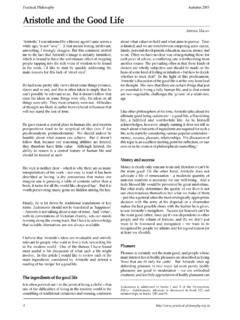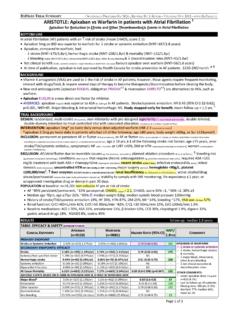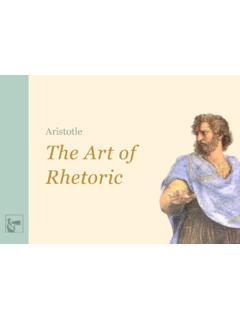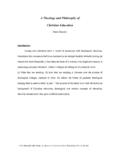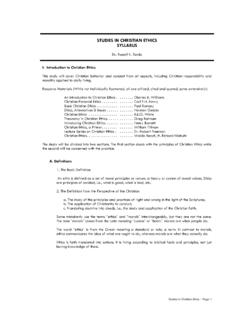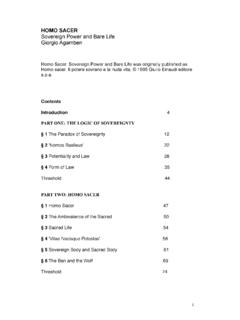Transcription of Aristotle’s Cardinal Virtues - About the Society
1 Practical Philosophy, 10:1, (web edition, 2011; originally published July 2010) 57 aristotle s Cardinal Virtues : Their Application to Assessment of Psychopathology and Psychotherapy James M. Stedman Abstract aristotle elaborated his theory of virtue in two texts, the Nicomachean and the Eudemian Ethics. Throughout the centuries, his theory of Virtues has endured despite a number of attempts to eliminate it as a framework for how one should live and flourish. This essay revisits aristotle s theory of virtue for two purposes.
2 The first is simply to note the remarkable depth of his understanding of human psychology and its development. The second focuses on his elaboration of the Cardinal Virtues and explores their application to modern psychopathology and intervention. Keywords: aristotle , ethics, psychopathology, psychotherapy, Cardinal Virtues Introduction The roots of virtue theory lie in pre-Socratic times but commenced in earnest with Socrates infuriating questioning of the values and beliefs of his fellow Athenians.
3 The theory was significantly advanced by Plato and was definitively elaborated by aristotle himself in his two ethical treatises, the Nicomachean Ethics and the Eudemian Ethics. Aristotelian thought was preserved by Arab scholars during the so-called Dark Ages and rediscovered by Christian thinkers during the high Middle Ages. Aristotelian moral philosophy was then incorporated into Christian moral theology/philosophy, particularly by Thomas Aquinas. Of course, the elaboration of virtue ethics did not cease with aristotle but continued as a major philosophical theme of the Stoics, Cynics, Epicureans, and other ancient philosophical schools.
4 As one author put it, virtue ethics persisted as the dominant approach in Western moral philosophy until at least the Enlightenment (Hursthouse, 2007, ), and it survives today, alongside its rivals, deontology and consequentialism. However, the present essay is based solely on aristotle s views. My thinking About virtue theory and its application to clinical formulation and psychotherapy started with a clinical situation. A young client, recently diagnosed with bipolar disorder, came to me for psychotherapy.
5 Of course, bipolar disorder is known to have a highly biological component and must be treated with medication. An MD colleague, with whom I have a working relationship, was handling medication management and referred the young man to me for counselling. Recent studies (Miklowitz et al., 2007) have demonstrated that bipolar patients can also profit from psychotherapy; and, in fact, combination treatment is now considered superior to medication alone. The client and I thoroughly discussed current thinking About bipolar disorder, specifically, that he must remain compliant with the medication regimen and that he and I would be James M.
6 Stedman aristotle s Cardinal Virtues Practical Philosophy, 10:1, (web edition, 2011; originally published July 2010) 58 working to understand both the biological and psychological aspects of his diagnosis. These issues were also shared with the referring physician. As I explored his history, I learned that, although very blessed cognitively, he had flunked out after his first semester at a prestigious university and was continuing the same pattern at a local university. He tended to spend excessive time on the internet to the neglect of academic effort and had thoroughly revived a passive-aggressive power struggle with his parents, a pattern which had defined his schooling over the years but particularly since his senior year in high school.
7 His history included a grade school diagnosis of ADHD, with positive response to stimulant medication. Although his academic record through elementary, middle, and most of high school was characterized by excellent grades, he often achieved success based on his superior intellectual ability and his mother s close scrutiny of his everyday schoolwork rather than his own motivated effort. When he reached the university level, his usual approach to academics failed. An additional feature of note was that he had applied for and got a number of jobs during and after high school but had never lasted long at any of them.
8 Some time into our sessions his behaviour improved (obtained a job and spent less time on the internet), and his parents allowed him to enrol at a local college to try once again. I saw him three weeks after classes commenced, and he announced that he was taking a demanding ethics course. He said they had just completed a virtue ethics review. Given that I have an undergraduate background in philosophy, I was intrigued and decided to show him a page in one of my books (Dictionary of Scholastic Philosophy, Wuellner, 1956) summarizing aristotle s four Cardinal Virtues : prudence, justice, temperance, and fortitude.
9 This summary included not only the Virtues themselves but also an elaboration of each virtue into subcategories characteristic of neo-scholastic thinking. As we examined this summary, it struck me that most of my client s psychosocial clinical issues could be formulated and even treated in relation to the Cardinal Virtues . The client was also intrigued by the prospects of understanding his psychology in virtue terms and could relate current and past interpersonal and scholastic problems to failures in virtue formation.
10 The depth of his reformulating his narrative in virtue terms increased over sessions. A partial version of the table is presented below. Table 1: aristotle s Cardinal Virtues and Their Subdivisions Subjective Parts1 Potential Parts2 Integral Parts3 Prudence: Habit of choosing right means to achieve worthy ends In Self-Direction In Domestic Behaviours In Public Affairs Ability in Command Ability in Execution Memory Docility Sagacity Valuation Reasoning Inventiveness Foresight Circumspection Caution James M. Stedman aristotle s Cardinal Virtues Practical Philosophy, 10:1, (web edition, 2011.)
